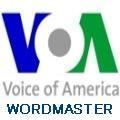AA: I'm Avi Arditti and this week on Wordmaster: more about business communication. We talked a couple of weeks ago about the value of a firm handshake and how it's okay to just say your name and "nice to meet you" when you're introducing yourself. Today, English teacher Nina Weinstein is back to talk about some ways to sound less formal in casual conversation.
NINA WEINSTEIN: "Generally speaking, whenever we have the chance to use a two-word verb, that is kind of an instant way to sound more informal and more natural." AA: "Why don't you give a couple of examples." NINA WEINSTEIN: "'Please stand'; 'please stand up.' 'I'm going to call my friend'; 'I'm going to call up my friend.' 'I'd like to set up a meeting' rather than 'I'd like to arrange a meeting.'" AA: "So 'set up' instead of 'arrange,' 'stand up' instead of just 'stand.' Adding those prepositions kind of [softens] them a little bit." NINA WEINSTEIN: "Right, it makes it more informal." AA: "Do you have a couple more examples?" NINA WEINSTEIN: "'Get together': 'Let's get together for a meeting this weekend' rather than 'Let's, um ... " AA: "Let's meet this weekend." NINA WEINSTEIN: "Meet, exactly, exactly. And we said, 'let's set up a meeting.' 'I'm tied up next week.'" AA: "As opposed to -- " NINA WEINSTEIN: "Busy." AA: "Yes." NINA WEINSTEIN: "Busy. We have many, many ways to say 'I'm busy': 'I have a lot on my plate,' 'I have a million things to do,' 'I have a ton of paperwork.' So all of these very colorful idioms sound more like a native speaker, more informal and more natural." AA: "Although actually, just going back to the word 'busy' for a second, I mean that doesn't sound too bad if you say 'I'm busy next week.' You could say 'I'm tied up,' but ... " NINA WEINSTEIN: "You can say 'I'm busy' but if that's the only way you can say it, it gets kind of stale and it makes your vocabulary sound as if it's pretty limited. So I always tell my students to rotate among a couple of idioms for these common situations like 'I'm busy.' We can say 'I'm swamped,' 'I have a ton of things to do,' 'I'm buried in paperwork.' So there are a lot of really interesting ways to say that, and because it's such a common situation, we want to know at least a couple of those." AA: "Without, I suppose, sounding too out there in terms of tossing around these expressions." NINA WEINSTEIN: "Well, these are very common ones and these are ones that other people will use as well. For instance, 'I'm tied up' -- that's much different than 'I'm busy.' There's a connotation that I cannot change whatever it is I'm doing. So if you call a company and you ask for Mister Jones and they say 'I'm sorry, he's tied up in a meeting,' the connotation of that is that you cannot interrupt him. So you wouldn't say, 'Well, could you please tell him I'm on the line?' You wouldn't say that because 'tied up' tells you that you cannot interrupt him, so it's the appropriate one to use. We don't want to just say 'I'm busy' because then it doesn't give the whole story." AA: So we've talked about handshakes and sounding more natural. But as English teacher Nina Weinstein points out, there's something else traditionally important when talking to Americans -- that is, making eye contact. CUT 2: WEINSTEIN/ARDITTI :25 NINA WEINSTEIN: "In some cultures it's not considered polite to look in the person's eyes when they're talking to you. But in our culture, if you don't make eye contact and look at their eyes when they're talking, the speaker might feel that you're bored or you're not listening. And so this is really important. Or, in business, they might not feel like you're telling the truth." AA: "If you're looking away." NINA WEINSTEIN: "If you're looking away. Exactly." AA: Nina Weinstein comes to us from the VOA bureau in Los Angeles. She has an English-teaching business and writes books that you can find online through Amazon and other sites. You can find her previous Wordmaster segments, including her advice about shaking hands, at our Web site, voanews.com/wordmaster. And that's all for this week. Our e-mail address is word@voanews.com. I'm Avi Arditti.

